15 Popular Misconceptions About The Church
A Summary Of The Teaching Video
Some of the points I cover in this teaching video:
This is the final study in the series on the arrangement of the biblical covenants. I contend in this study that the church is by nature always local and visible. The concept of a universal and invisible assembly of Christ is an idea that must be read into the scriptures, rather than drawn from it.
Jared Smith, Muntinlupa, PH (17/02/2023)
An Outline Of The Teaching Video
The Four Divinely Appointed Religious Institutions
The Two Divinely Appointed Religious Institutions That Have Been Designed For God’s Spiritually Elect People
The Family Unity
The Church Of Christ
Romans 16:3-5
1 Corinthians 1:2
2 Corinthians 8:1
Galatians 1:1,2
Colossians 4:15,16
1 Thessalonians 2:14
Philemon 1,2
Misconceptions About The Church Of Christ
The Church Is A Universal And Invisible Body Of All God’s Spiritually Elect People
Israel Of The Old Testament And The Church Of The New Testament Refer To God’s Spiritually Elect People Throughout The Ages
My Response To These Misconceptions About The Church Of Christ
The Church Is NOT A Universal And Invisible Body Of All God’s Spiritually Elect People
The Generic Use Of The Term Church In Scripture
The Universal Use Of The Term Church In Scripture
Israel Of The Old Testament And The Church Of The New Testament DO NOT Refer To God’s Spiritually Elect People Throughout The Ages
Reformed Believers Conflate The Terms In An Attempt To Correct The False Gospel Of Dispensationalism
Reformed Believers Use The Terms Israel And Church Interchangeably, When They Should Use The Term Israel Only As An Analogy For All Of God’s Elect People—The Jewish People As A Nation Under The Mosaic Covenant Is An Illustration Of God’s Spiritually Elect People Under The Covenant Of Redemption (It Is Not An Illustration Of The Church Or Churches)
Romans 9:6-8
Romans 11:7
Concluding Thoughts
Is Israel And The Church One And The Same?
Is Israel And The Spiritually Elect One And The Same?
Are The Spiritually Elect And The Church One And The Same?
A Final Word
An Automated Transcript Of The Teaching Video
I’d like to welcome you back for another study in the Word of God. In our previous study, I highlighted for you what I believe the meaning of the church to be and how it’s distinguished from other labels and entities such as the elect and Israel.
The Four Divinely Appointed Religious Institutions

In a nutshell, I believe there are four divinely appointed religious institutions throughout the course of history. The first two of these institutions were designed for God’s spiritually elect people, and therefore are spiritual and perpetual in nature. The first of these institutions is the family unit and the second is the church. The other two institutions were designed for God’s physically elect people—the people of Israel—and therefore were earthly and temporary in nature. This would be that of the tabernacle and the temple. Now there’s much that we, God’s spiritually elect people, can learn from the tabernacle and the temple. For one of the main reasons God established those institutions was that they might serve as a parable or illustration of the redeeming work of Christ. However, when we speak about those religious institutions which are active and relevant for God’s people today, then we’re concerned only with these first two religious institutions, the family unit and the church, both of which are active today.
The Two Divinely Appointed Religious Institutions That Have Been Designed For God’s Spiritually Elect People
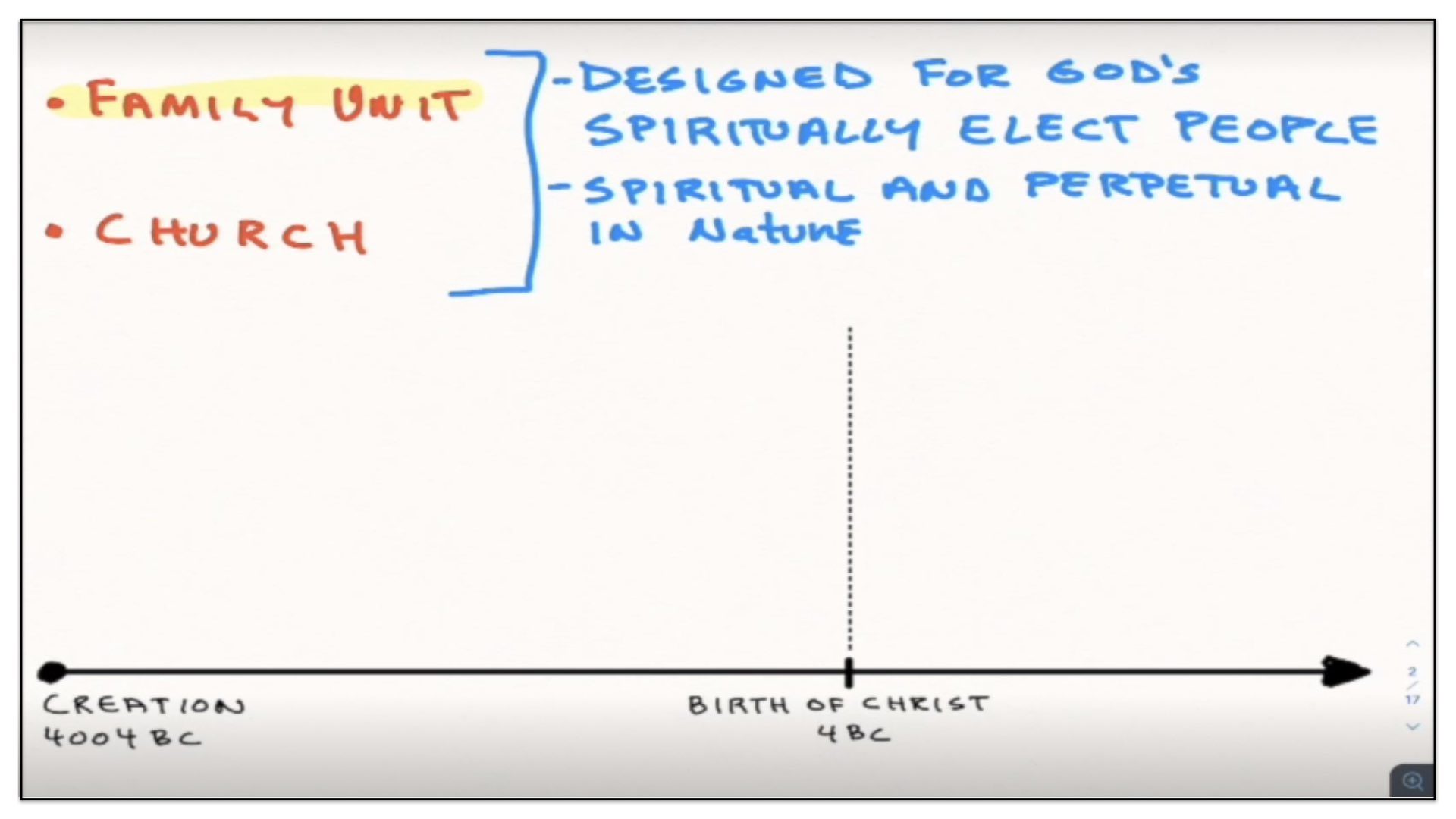
The Family Unity
Turning your attention then to those religious institutions, along with the timeline that will help me better explain these matters, I’d like to begin by highlighting for you some things concerning the family unit. The first of these institutions, the family unit, was the original place for God’s spiritually elect people to meet. After they experience the new birth—and they all did, tracing our way all the way from Adam and Eve, all of them experienced the new birth, that they be numbered among God’s spiritually elect—after they experienced the new birth, they would naturally seek to worship God within their own little communities. And this would have been formed naturally by the members of their own family.

Now picture the family unit. I’ll just draw a circle to represent the family unit. And within each of these family units, some family units had no regenerate sinners at all. They were all reprobate or not numbered among God’s spiritually elect people. But there were other family units which did have certain members of the family that had been born again. But keep in mind there were also other members of the family who had not been born again. So the family unit, if there be those that had been born again, was usually made up of both regenerate and unregenerate sinners. Nevertheless the regenerate sinners sought to convene corporate worship within the community of their family unit and they would call together all of those within the home and they would seek to worship God and find fellowship together and to edify one another according to their knowledge of the gospel. And in this sense, they were more than just brothers and sisters or blood relation. They were spiritually united through the blood of Christ and therefore brothers and sisters in Christ.
Now if it was the husband/father who had been born again, he would naturally assume the role as priest or pastor for the family unit. But very often that role would fall to the mother or wife, for the husband was dead or no longer in the family, or else he himself was an unbeliever and therefore the wife or mother would be the one to step up and serve as the spiritual guide for her family. And then of course there were times when both parents were unregenerate, and therefore it was one or more of the children, having been born again, would seek to worship God within the context of their family unit.
Now we mustn’t think of the family unit as it existed for family worship or corporate worship as the members of those families organizing themselves into some type of formal service. As we might do today in churches with the formal order of service—there being a prayer, reading of scripture, singing of hymns, a specially designed sermon, and so forth. No, no, these family units would have been more fluid in how they met together for worship, and fellowship, and edification. It’s unlikely they had specific times in the week that they met together. It was just a very informal situation where the members of the family would come together throughout the week, throughout the month, throughout the year, in order to worship God corporately.
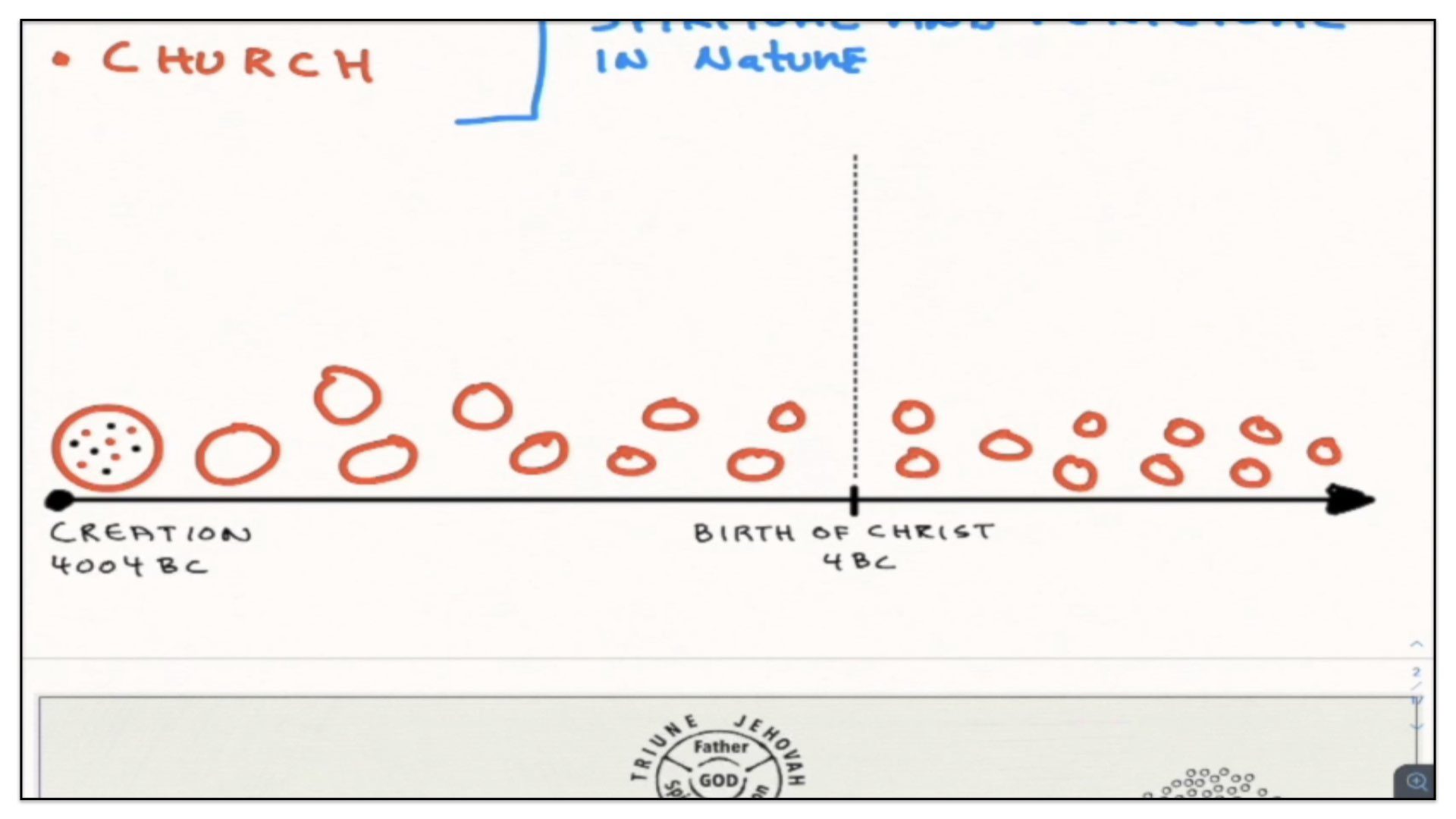
Now this is how it happened for the first 4,000 years of history. These types of gatherings found in the family unit existed all the way to the birth of Christ, and has continued to exist even after the birth of Christ to our current day. The family unit is a spiritual and perpetual religious institution. And today, just as happened 6,000 years ago the regenerate sinners belonging to a family unit will and should seek to meet together within their homes for worship and fellowship and edification with one another.
The Church Of Christ
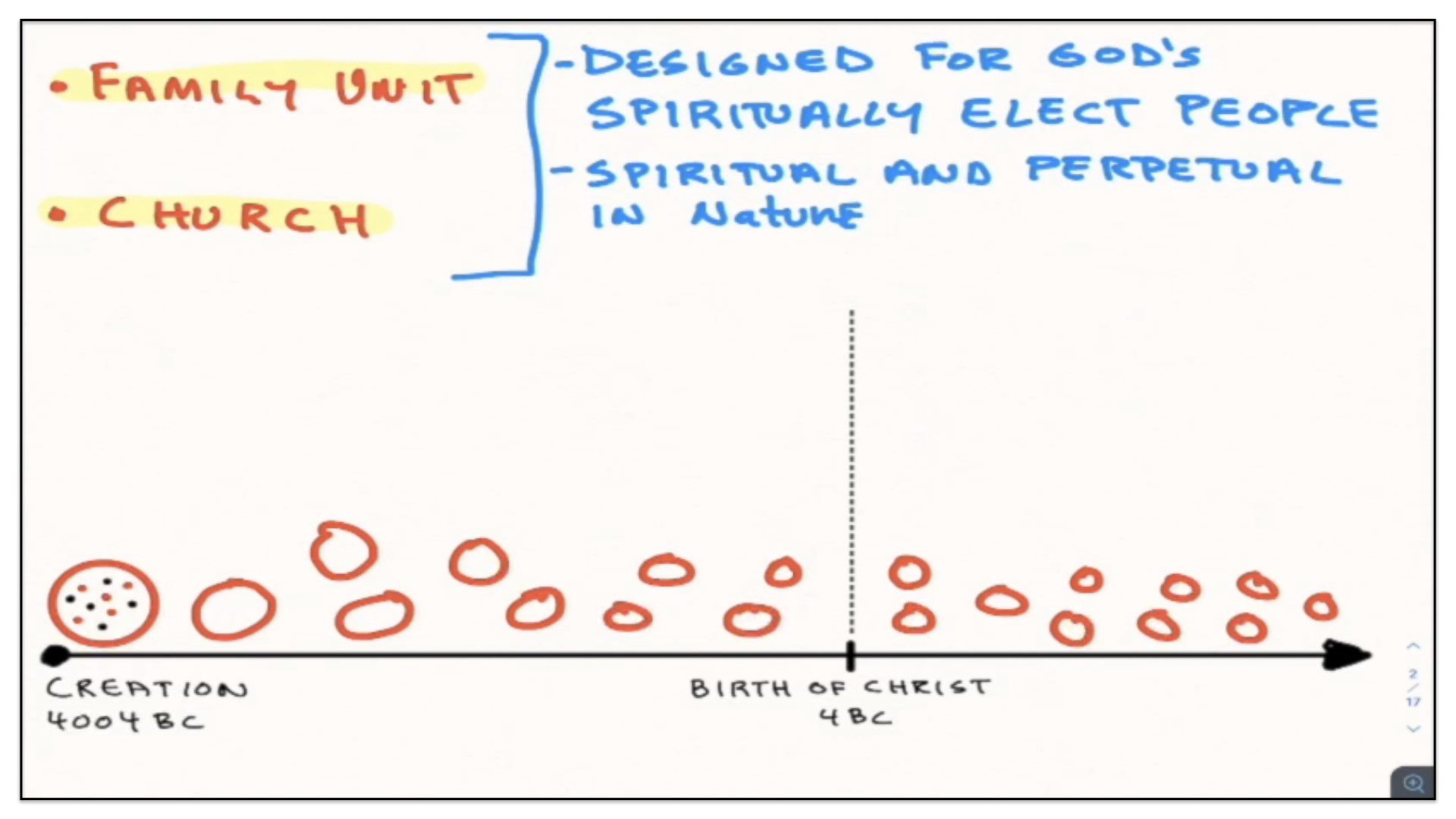
Now having said that, when Christ began His earthly ministry, He started something very new. A new institution. By gathering together and organizing a church. And now I refer you to the second of these religious institutions, the church. As we considered last week, the Greek term rendered church in our English Bible is ecclesia. And the Greek term ecclesia means congregation or assembly. It refers to a group of people who have been called together from their homes. I’d like you to capture the significance of that meaning.
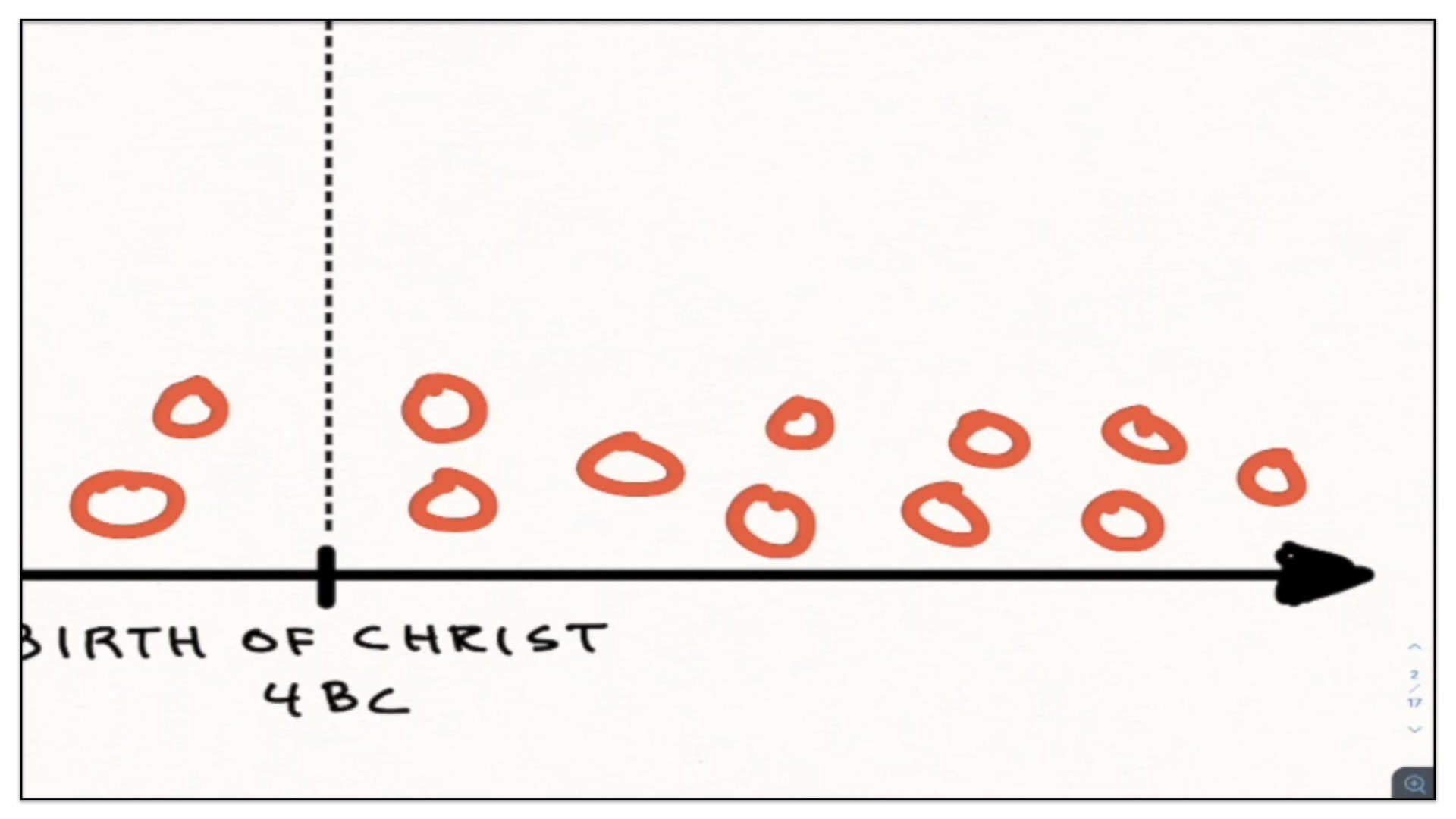
Here we have individuals worshiping God. Serving the Lord, fellowshipping with one another, receiving edification through the gospel within the context of their family units. That’s how it had been done since the beginning with Adam and Eve onwards.
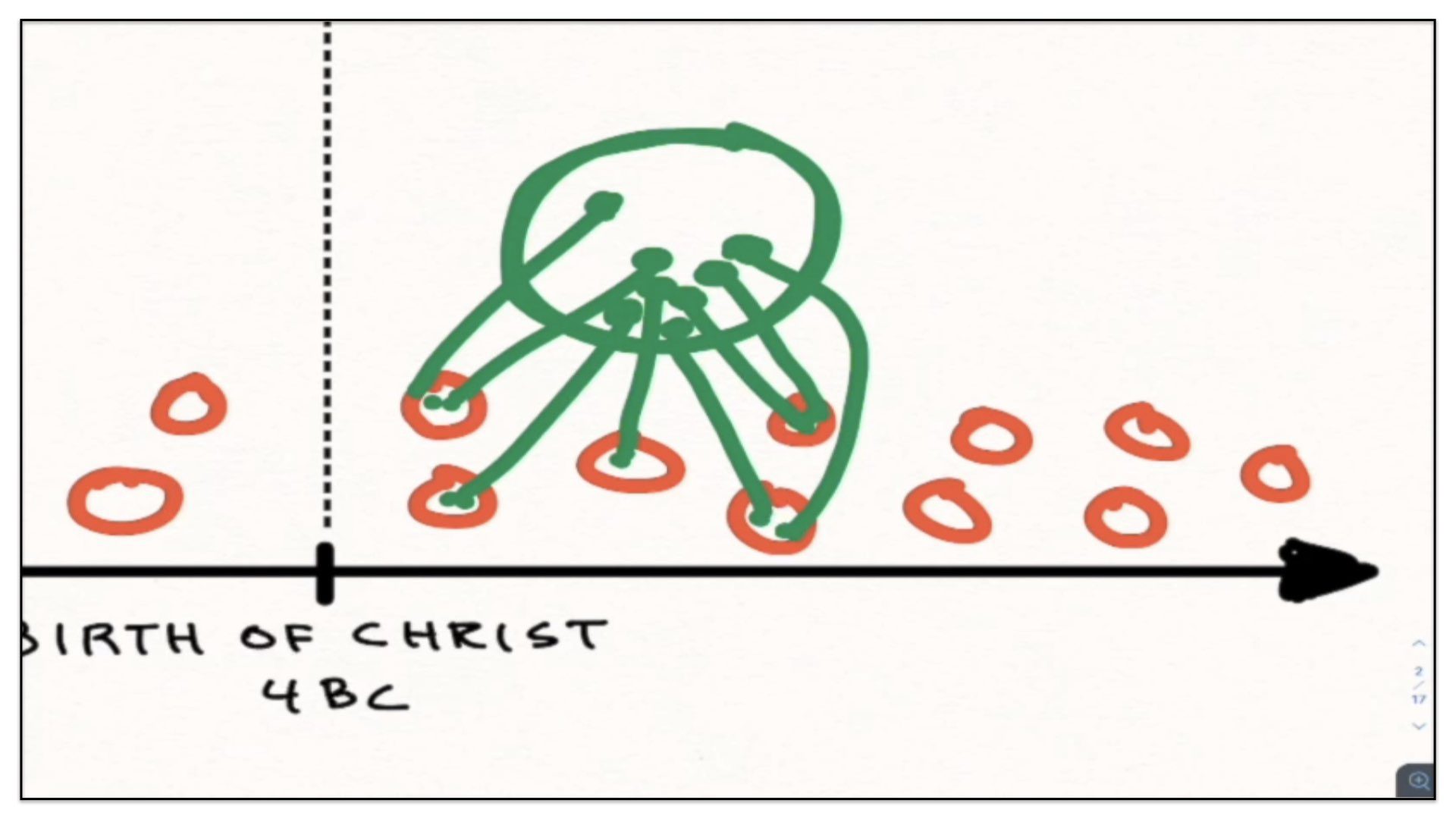
But now Christ—and I’ll just change the color pen—now Christ is calling out regenerate sinners from these homes. He’s calling them out and He’s organizing a new institution, a new assembly, a new congregation. It’s not the family unit. Christ is calling out from these family units only regenerate sinners. And as the scriptures record, not only was it necessary for these persons to be regenerated, but they must have also been baptized, that is immersed in water. Which is a symbol of their new life in Christ. And not only this, but the New Testament scriptures also tell us that in order to be a member of this new institution, the church, one must covenant with the other members of that congregation to follow the commands of Christ. So there in essence are three qualifications in order to be a member of one of Christ’s assemblies. One must be born again, and then immersed in water or baptized, and then covenanted with the other members of that particular fellowship to serve and follow Christ. Now that is precisely what we find with the first church organized by Christ during His earthly ministry. Christ called out from their homes twelve men, all of whom had made a profession of faith, all of whom had been baptized by John the Baptist and all who covenanted with one another to follow the commands of Christ. And that my dear friends, is what I believe the scriptures reveal to be the meaning of the church or Christ’s assembly. The church is a congregation or body of baptized believers covenanted to follow the commands of Christ.
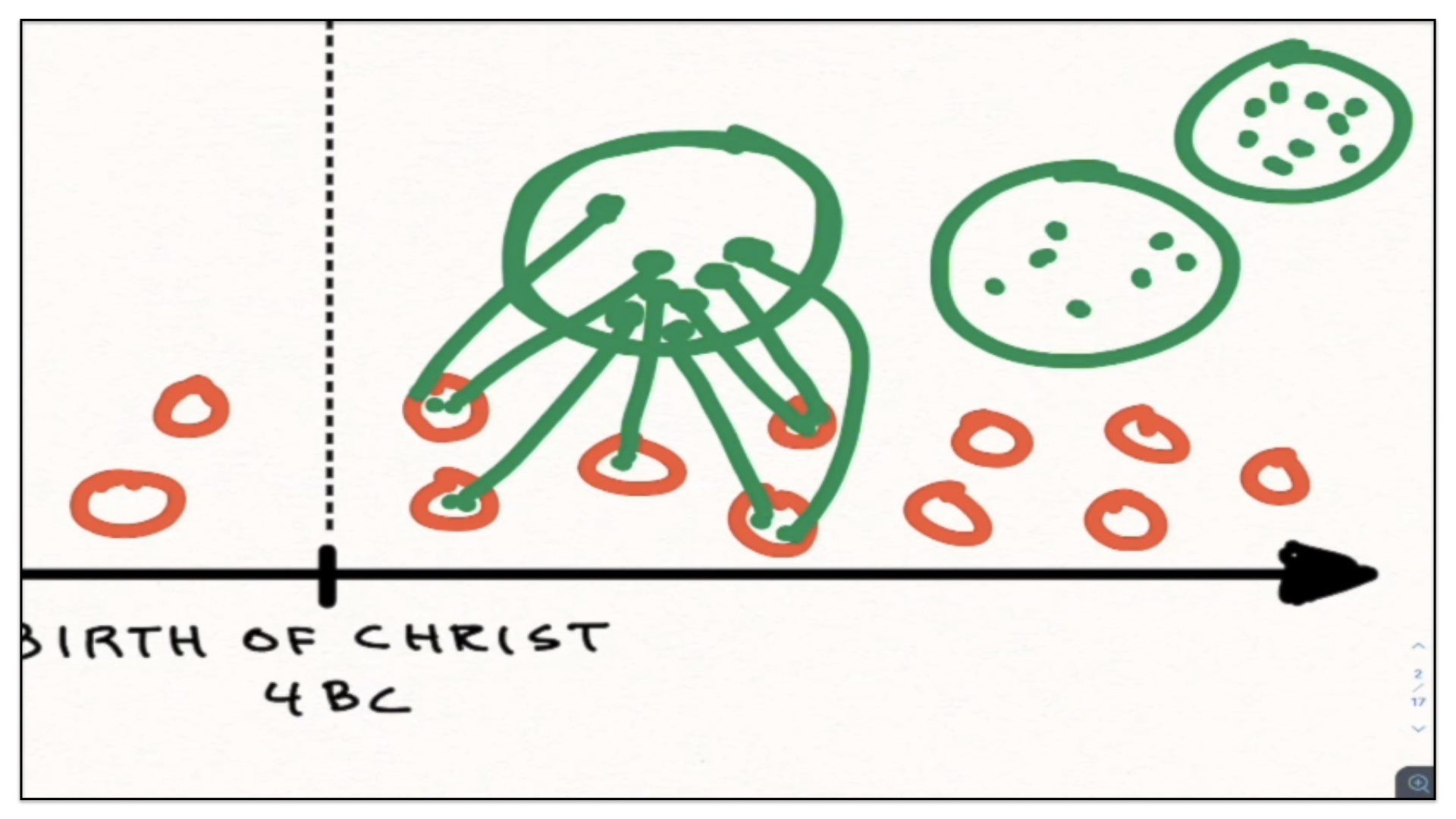
Now when using the term church in the singular, it refers to a local and visible congregation of such persons, but when using the term in the plural, churches, it refers to two or more assemblies of Christ. Allow me to give some examples of this from the Word of God.
Romans 16:3-5
Take for instance the words of Paul in the closing chapter of his letter to the church at Rome. I’ll be reading for you from Romans chapter 16 beginning in verse 3. Here you’ll find a reference to the church singular and to churches plural. The Apostle wrote—“Greet Priscilla and Aquila my helpers in Christ Jesus: Who have for my life laid down their own necks: unto whom not only I give thanks, but also all the churches of the Gentiles. Likewise greet the church that is in their house.” Here the word church is used in the singular and the plural. There are many churches scattered throughout the Gentile world. They’re called churches. And then Paul makes reference to one particular church that was meeting in the house of Priscilla and Aquila. Do you see? The Bible uses the term church, it’s always a reference to a local and visible assembly of baptized believers.
1 Corinthians 1:2
Again, I turn your attention to another one of Paul’s writings. This is First Corinthians chapter 1 and I want to read for you a little statement in the first few verses just here, in verse 2 actually. The Apostle wrote—“Unto the church of God which is at Corinth,” quite clearly Paul is addressing this letter to one particular church that was located at Corinth.
2 Corinthians 8:1
Again, if we turn to Paul’s second letter to the Corinthians chapter 8 and I’ll read to you a little statement in verse 1. Paul wrote—“Moreover, brethren, we do you to wit (or to know) of the grace of God bestowed on the churches of Macedonia;” Now in the plural would refer to a group, or a number of independent assemblies of Christ.
Galatians 1:1,2
Again, another one of Paul’s letters if we turn to Galatians chapter 1 and I’ll read to you from verse number one—“Paul, an apostle, (not of men, neither by man, but by Jesus Christ, and God the Father, who raised him from the dead;) And all the brethren which are with me, unto the churches of Galatia:” Now it’s evident that Paul wrote this letter to all the churches scattered around Galatia. Galatia was not one little city. It was a whole region and Paul was writing this letter as a type of circular letter that would be passed around from one independent local and visible assembly of Christ to the next one.
Colossians 4:15,16
Once more, we can turn to another letter of Paul, his letter to Colosse and I will turn your attention to the fourth chapter and the 15th verse. Paul wrote—“Salute the brethren which are in Laodicea, and Nymphas, and the church which is in his house.” Now here Paul refers to one particular church or assembly that was meeting in the house of one named Nymphas. And then if you look in verse 16 Paul refers to another assembly that was meeting in Laodicea, for he says, “And when this epistle is read among you, cause that it be read also in the church of the Laodiceans;” So once more you see how Paul uses the term church within a local and invisible context of a group of believers that had been baptized, physically gathered and covenanted together, to follow the commands of Christ.
1 Thessalonians 2:14
Again, we read in First Thessalonians, First Thessalonians chapter 2 and verse 14. Paul wrote—“For ye, brethren, became followers of the churches of God which in Judaea are in Christ Jesus:” Here Paul refers to many assemblies or churches of Christ that were scattered throughout Judea.
Philemon 1,2
And again, if we look in Philemon. There’s no chapters to Philemon, just verses. Philemon verse 1—“Paul, a prisoner of Jesus Christ, and Timothy our brother, unto Philemon our dearly beloved, and fellowlabourer, And to our beloved Apphia, and Archippus our fellowsoldier, and to the church in thy house:” Now here Paul is referring to one particular assembly of Christ that was meeting in the house of Philemon.
And I could multiply the number of scriptures I’ve read for you tenfold and they refer to a local, visible, physical grouping of God’s baptized believers covenanted to follow the commands of Christ. Well, I hope you therefore see just based on the scriptures we’ve read together, it’s in this way the term church is used throughout the New Testament scriptures. As I’ve just said, it’s a local and visible gathering of baptized believers covenanted together to follow Christ’s commands.
Misconceptions About The Church Of Christ
Now I emphasize all of this and I’ve repeated myself a few times last week and this week, because this is not how some Christians understand the term church, or use the term church. There are two popular views that use this term church in a different and I might say an erroneous way. But these erroneous views have secured a strong hold in many minds.
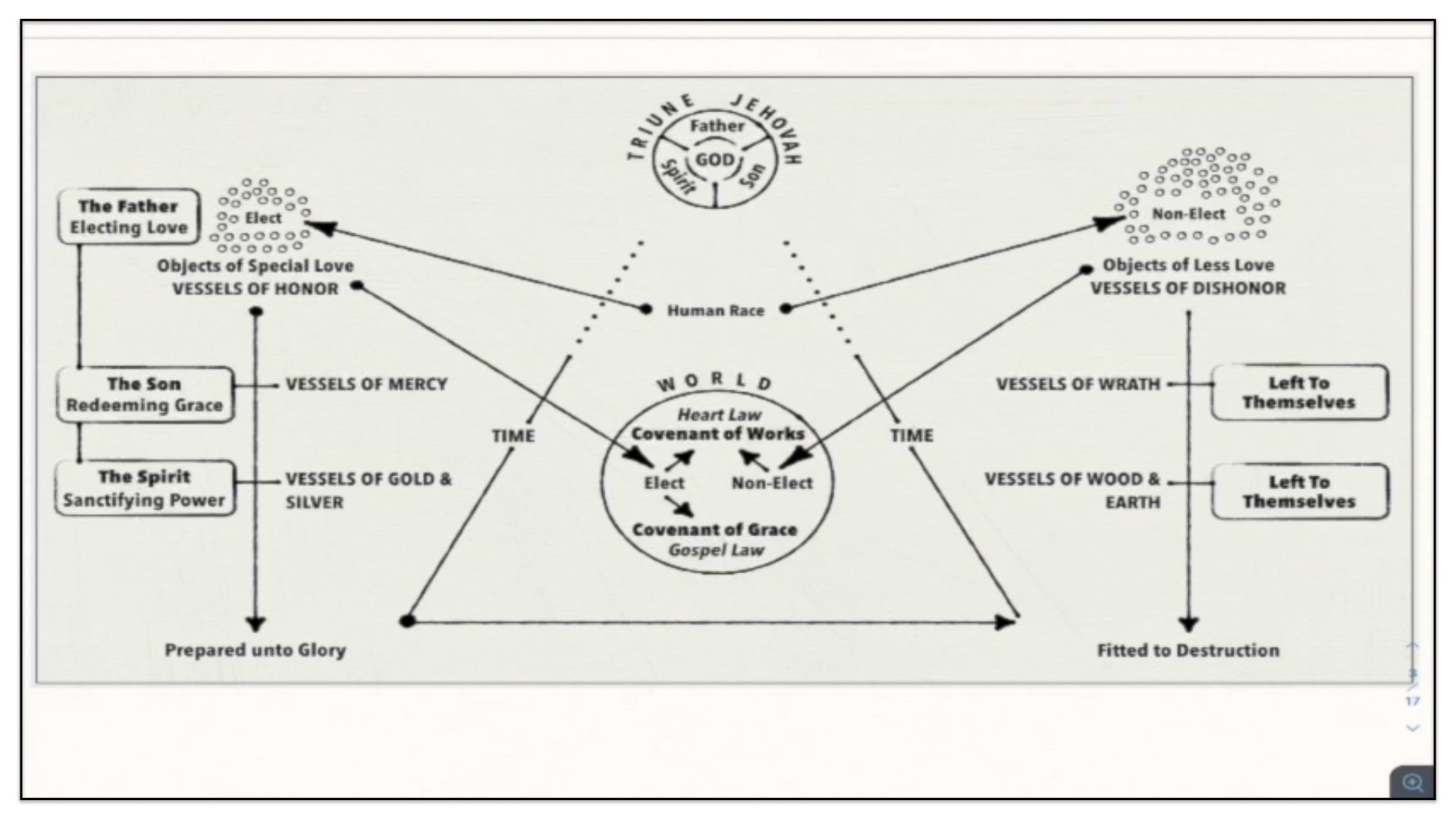
Allow me to turn your attention to the Framework of Sovereign Grace where I might better be able to explain to you the view, the erroneous views of those who misunderstand the nature of the church.
The Church Is A Universal And Invisible Body Of All God’s Spiritually Elect People
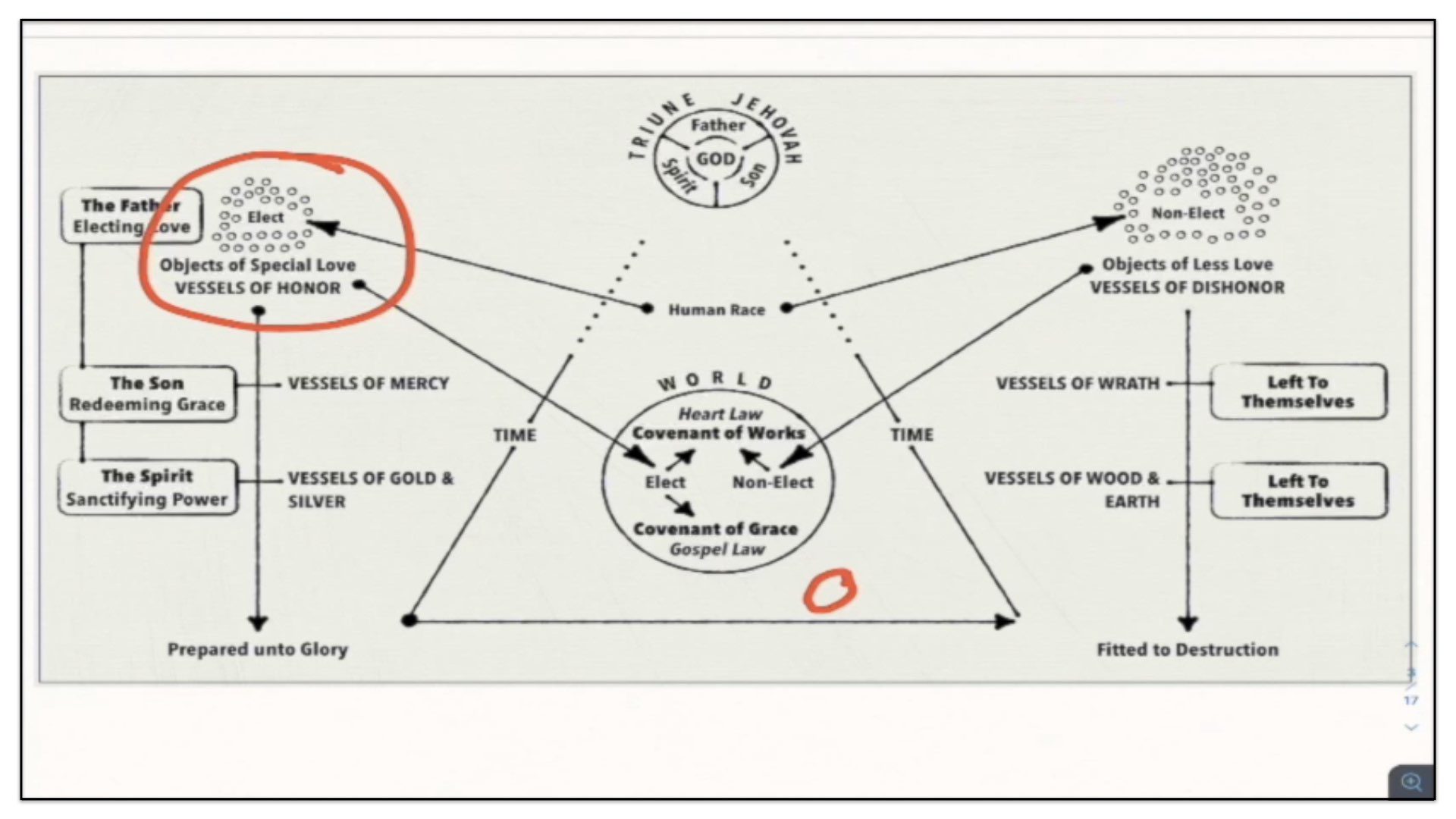
The first of these views introduces a new concept, namely, that the church is a universal and invisible body of all God’s spiritually—let me change the color pen—of all of God’s spiritually elect people throughout the ages. You see, they no longer view the church primarily to be that of a local and visible assembly, but rather a mystical assembly. An invisible or universal assembly of all God’s spiritually elect people throughout the ages. This, they say, is the primary meaning of the term church. However, they don’t deny that there is also a local invisible aspect to the church on the earth. But they see the local and visible aspect of the church to be secondary or subordinate to the universal and invisible grouping of all God’s elect people throughout the ages. And I say, therefore, one must be very discerning when listening or reading Reformed teachings. Mainly it’s the Reformed teachers that promote this view.
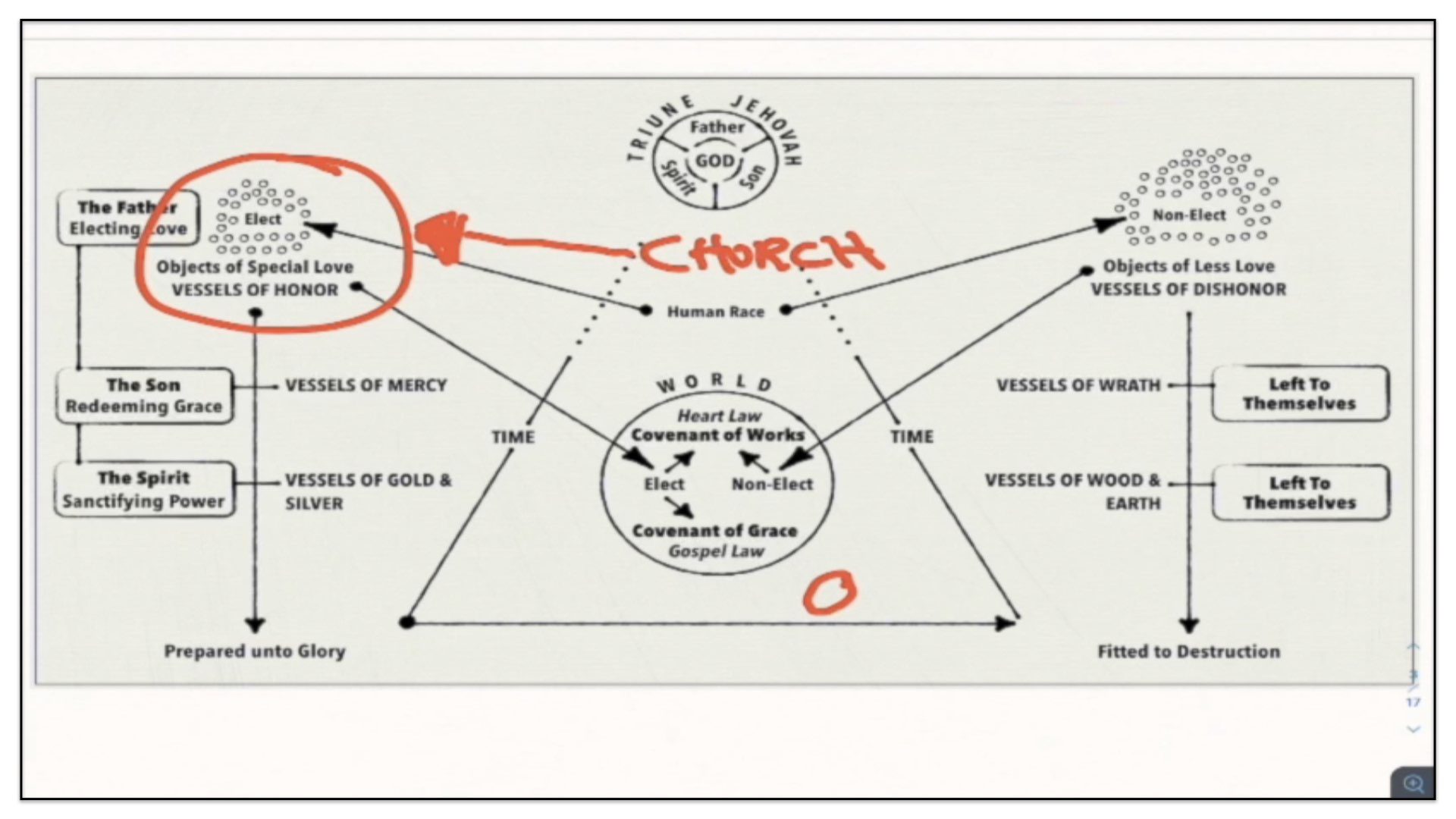
It’s not uncommon for them to use the term church—I’ll just put the term here, the term church—as a synonymous label for all of God’s spiritually elect people as a whole. Many Reformed believers will explain it in this way. They’ll say, “The church is primarily the universal and invisible body of all God’s elect people throughout the ages. However, when God’s people meet together on the earth, then it becomes local and visible.”
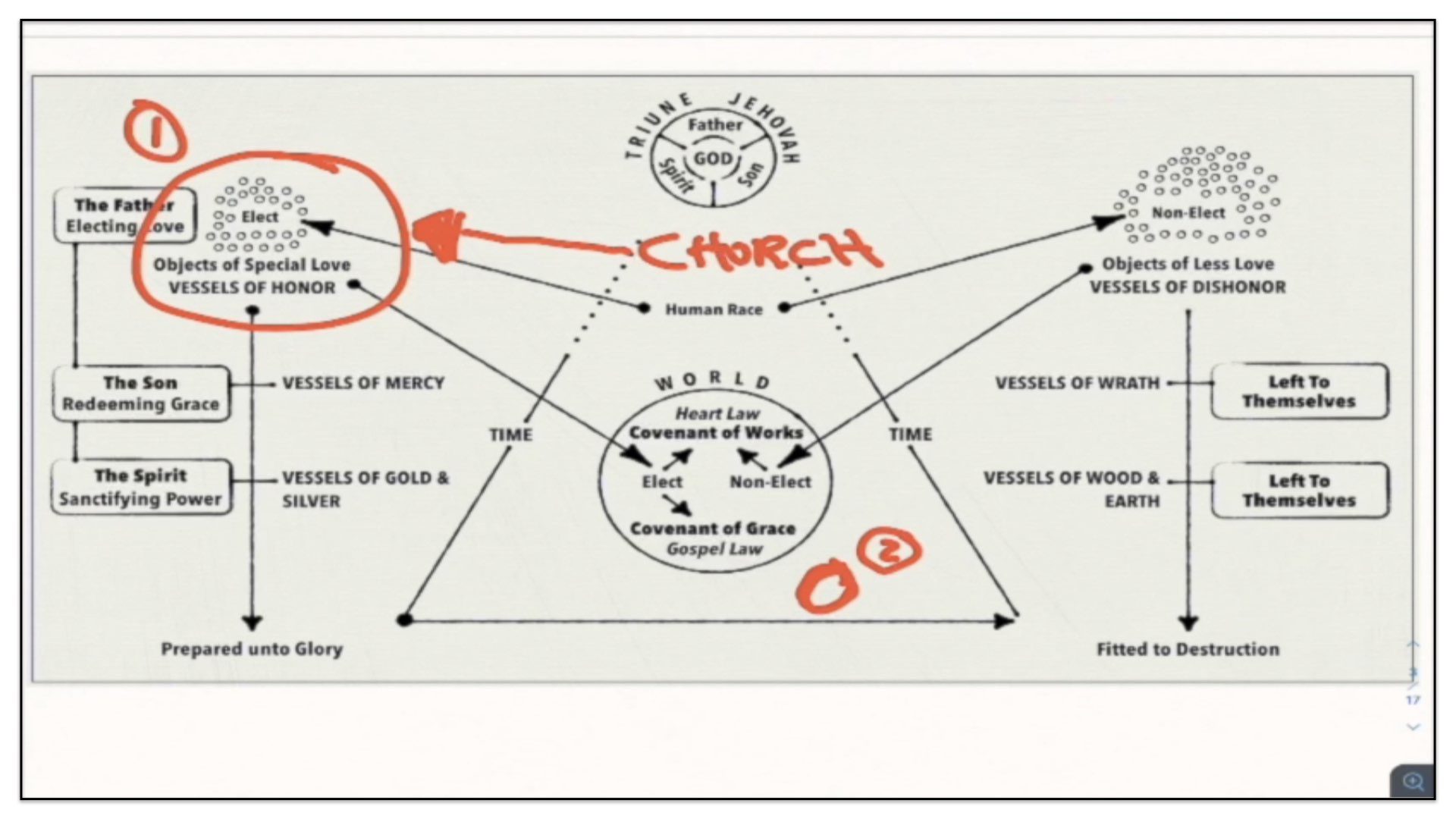
They say, “This is the first and primary meaning and then this is a secondary or subordinate meaning of the term church.”
Of course, the whole concept of a universal and invisible church is not something that is drawn from the scriptures. Rather, it is something that must be read into the scriptures. Now, we’ve already read several scriptures in this study, and as you’ve seen, there is not one indication that the church is to be viewed as a universal and invisible body of all believers throughout history. And so I say, in order to read the scriptures and interpret those texts as a universal and invisible grouping of all God’s elect people, it’s something that one must read into the scriptures. It’s not something the scriptures themselves set forth. I would go as far to say this whole notion of a universal church is something that has arisen from what they call the Holy Mother Church of Rome. When I say they, I mean Catholics of course. The Holy Mother Church of Rome. For as you know, they are called the Catholic Church and the word Catholic means universal. And it’s the Roman Catholic Church which ultimately introduced this concept of a universal grouping of God’s people. And you see, when during the time of the Reformation, when those who came out from the Roman Catholic Church sought to reform the Roman Catholic Church, rather than questioning the legitimacy of that view—that the church is universal—the Reformers or Protestants embraced and accepted that view. And they have continued till today to view the church as having a universal and invisible nature. Well, that’s the first view that I believe to be erroneous and it happens to be probably the leading view among those who are Protestant or Reformed in theology.
Israel Of The Old Testament And The Church Of The New Testament Refer To God’s Spiritually Elect People Throughout The Ages
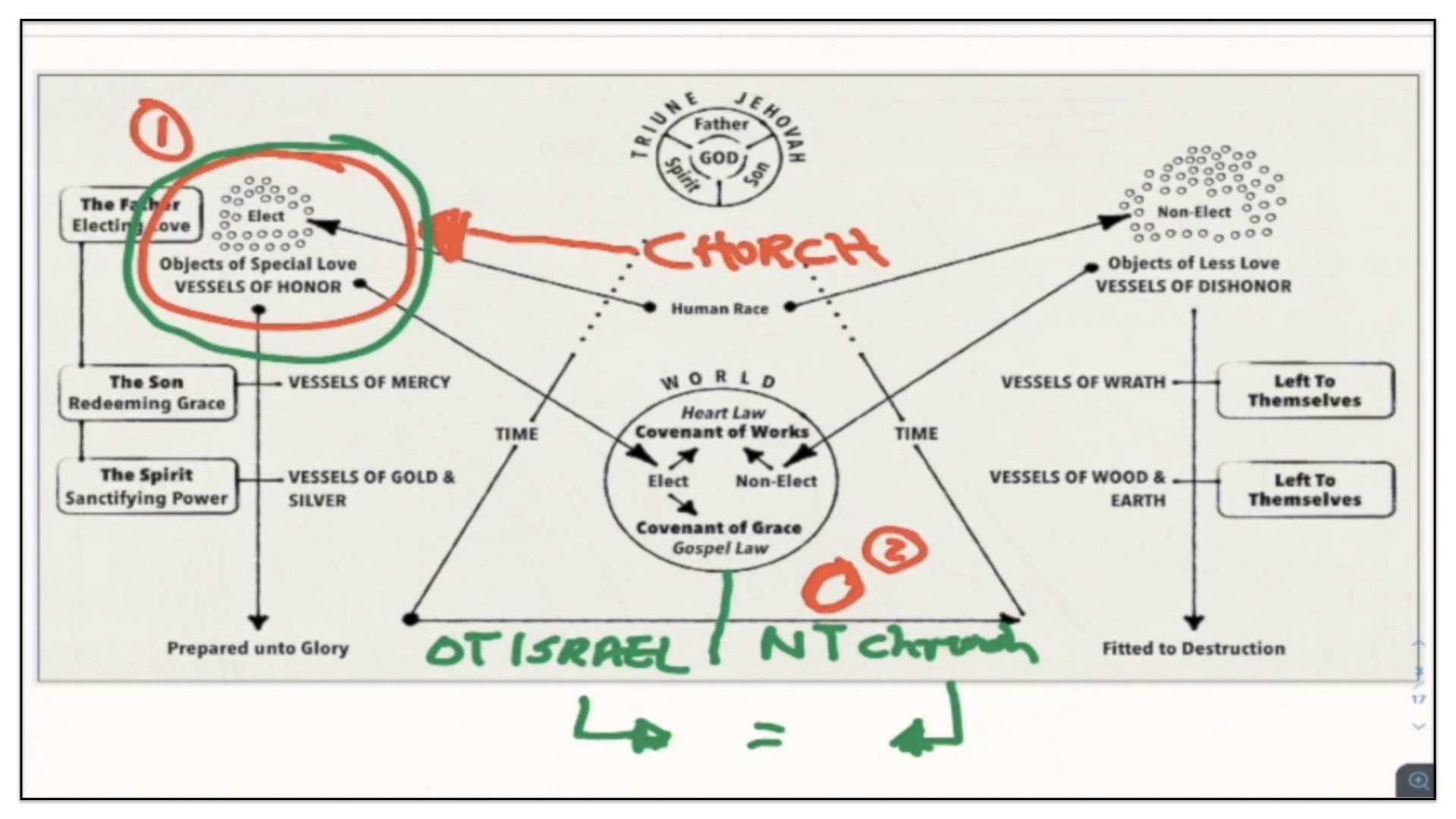
Let me just introduce you to the second view and then I’m going to respond to both of them. But here’s the second erroneous view. The second view is built upon the first, that is, this idea of a universal and invisible church. It’s argued, just as the church in the New Testament, the New Testament Church, they say, just as that represents all of God’s spiritually elect people throughout the ages, so Israel, Old Testament Israel, also represents all of God’s spiritually elect people throughout the ages. And therefore, they say, Israel and the church are one and the same. Israel is the church. The church is Israel. Israel refers to God’s spiritually elect people. The church refers to all of God’s spiritually elect people. And these terms are now used interchangeably. And there are some Reformed teachers that are most confusing in their expositions of scripture because they freely use these terms without distinguishing them. They’ll refer to all of God’s spiritual people by using the labels church or Israel, and never distinguishing between these ideas which we know, while reading through the scriptures, there are differences between these terms.
My Response To These Misconceptions About The Church Of Christ
The Church Is NOT A Universal And Invisible Body Of All God’s Spiritually Elect People
The Generic Use Of The Term Church In Scripture
Now what is our response to these things? Let me respond first to the first erroneous view that the church is universal and invisible. If you’re watching this and that is a view that you have been taught, perhaps a view that you embrace by conviction, you might say to me, “Wait a second, do not the scriptures teach this concept of a universal and invisible nature to the church of Christ? Do not the scriptures themselves refer to all of God’s spiritually elect people as the church?”
Well, my answer to that is yes and no, and there are several scriptures which refer to all of God’s spiritual elect people with the term by using the term church, but the context reveals all. And I hope to show you that while the scriptures refer sometimes a few times only to the church as all of God’s spiritual people yet it’s not a reference to a group of people that exists at this particular their time. Let me explain what I mean and I want to do so by first turning your attention to a passage of scripture which many will refer to with reference to the church being universal and invisible.
This is found in Matthew chapter 16 and verse 18. It’s the first time the word church is used in the New Testament scriptures and it’s the Lord Jesus Christ who uses it. And He said to Peter,—“And I say also unto thee, That thou art Peter, and upon this rock I will build my church; and the gates of hell shall not prevail against it.” It’s assumed when Christ used this term church, He was referring to all His spiritually elect people throughout the ages. However, there is nothing in the text which would lead us to that conclusion. I mean, the only reason we would form that conclusion is if we come at the text with the preconceived idea, that the church of Christ refers to the universal and invisible grouping of God’s spiritually elect people throughout the ages. But you see, if you don’t have that preconceived idea and you read Matthew chapter 16 verse 18, we would naturally interpret the word church to refer to a local and invisible grouping of Christ’s assembly. An assembly, by the way, which Christ Himself had already formed when He spoke these words to Peter. Peter himself was one of the members of that assembly. How do we then interpret this word church in Matthew 16:18, as the term is in the singular and not the plural?
Well, I would say that the word church in this text is to be understood generically or institutionally. That is, Christ is speaking of a local and visible church when using this term, for as we see from the previous scriptures, that’s how the term is used in the Bible, always a local and visible congregation. But in Matthew 16:18 Christ is speaking of this local visible church, as a representative of all individual and independent churches scattered around the world. Meaning that what is true of the little church Christ Himself organized during His earthly ministry, that assembly which had thirteen members, the twelve disciples and Christ Himself, it’s true of every little church that will be organized thereafter. That is, Christ organized the first church during His earthly ministry and the gates of hell would not prevail against it. So all other churches to be organized thereafter will also be built on Christ and they too shall not be prevailed against by the gates of hell. You see, the church when spoken of generically, as Christ does here in Matthew 16:18, it always finds its expression in a local and visible assembly of baptized believers who have covenanted to follow the commands of Christ. And there are several texts in the New Testament which use the term church in a generic or institutional sense. But we mustn’t make the mistake on then assuming the word church, though used generically, is a reference suddenly to a universal grouping of all God’s mystical people. Those are two entirely different things.
The Universal Use Of The Term Church In Scripture
However, having given this explanation on how the term church may be used generically, as opposed to universally, it is argued further by Reformed believers that there are other scriptures, which do not use the term church generically, but certainly do refer to the church as representative of all God’s spiritually elect people throughout the ages.
Now, there’s only a few references in the New Testament that use the term in that way, the most popular these passages is Ephesians chapter 5 and Hebrews chapter 12. Now both of these scriptures have the same meaning and therefore there’s no need for me to read both of them and give an explanation. I’d like to select for you Hebrews chapter 12 and read for you from that chapter the relevant text and give my explanation to both of these scriptures based on this particular text. In Hebrews chapter 12, I’ll begin reading in verse 22. These are the words of the Apostle Paul and I’m going to read from verse 22 to verse 24—“But ye are come unto mount Sion, and unto the city of the living God, the heavenly Jerusalem, and to an innumerable company of angels, To the general assembly and church of the firstborn, which are written in heaven, and to God the Judge of all, and to the spirits of just men made perfect, And to Jesus the mediator of the new covenant, and to the blood of sprinkling, that speaketh better things than that of Abel.”
I’d like you to notice the language in verse 23—“to the general assembly and church of the firstborn.” “There,” they say, “the scripture quite clearly speaks of the church as a general or universal assembly of all God’s spiritually elect people throughout the ages.” And on this point, yes, I don’t dispute the scriptures using this language.
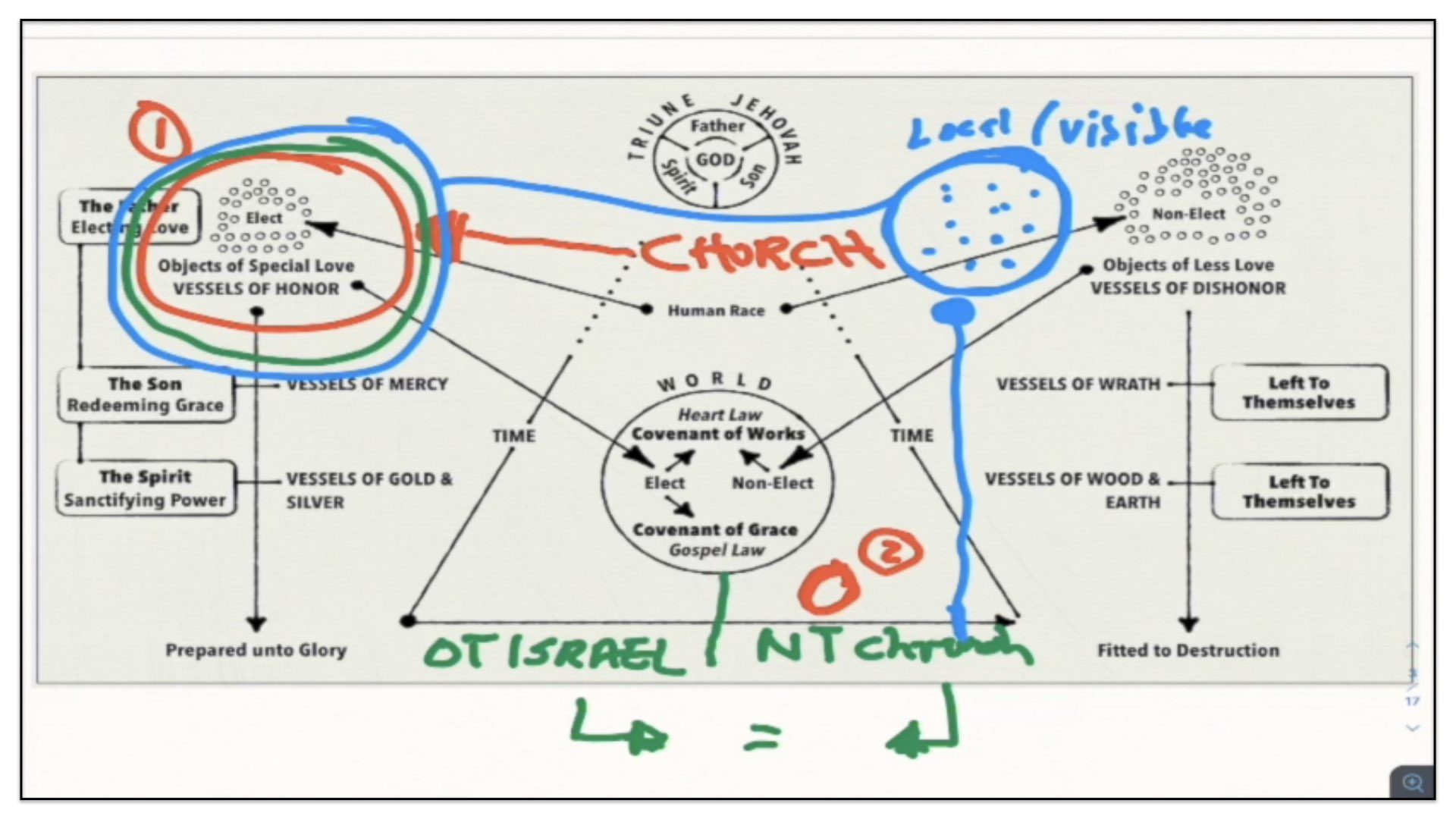
However, please note, within the context of this language, Paul is referring to the second coming of Christ. Look at the Framework of Sovereign Grace. Paul is referring to that point when Christ will return to the earth, at which time He will gather together all of His spiritually elect people throughout the ages, all of whom will be given glorified bodies, and therefore all of whom will be at that time gathered together in one place in the heavens, in the clouds, which will technically still be a local and visible assembly of Christ’s people. However, since Christ has not yet returned, He has not yet gathered together all His spiritually elect people throughout the ages, and therefore all of His elect people have not received a glorified body, and therefore that general assembly or universal assembly of all God’s elect people, referred to by Paul in Hebrews chapter 12, does not yet exist.
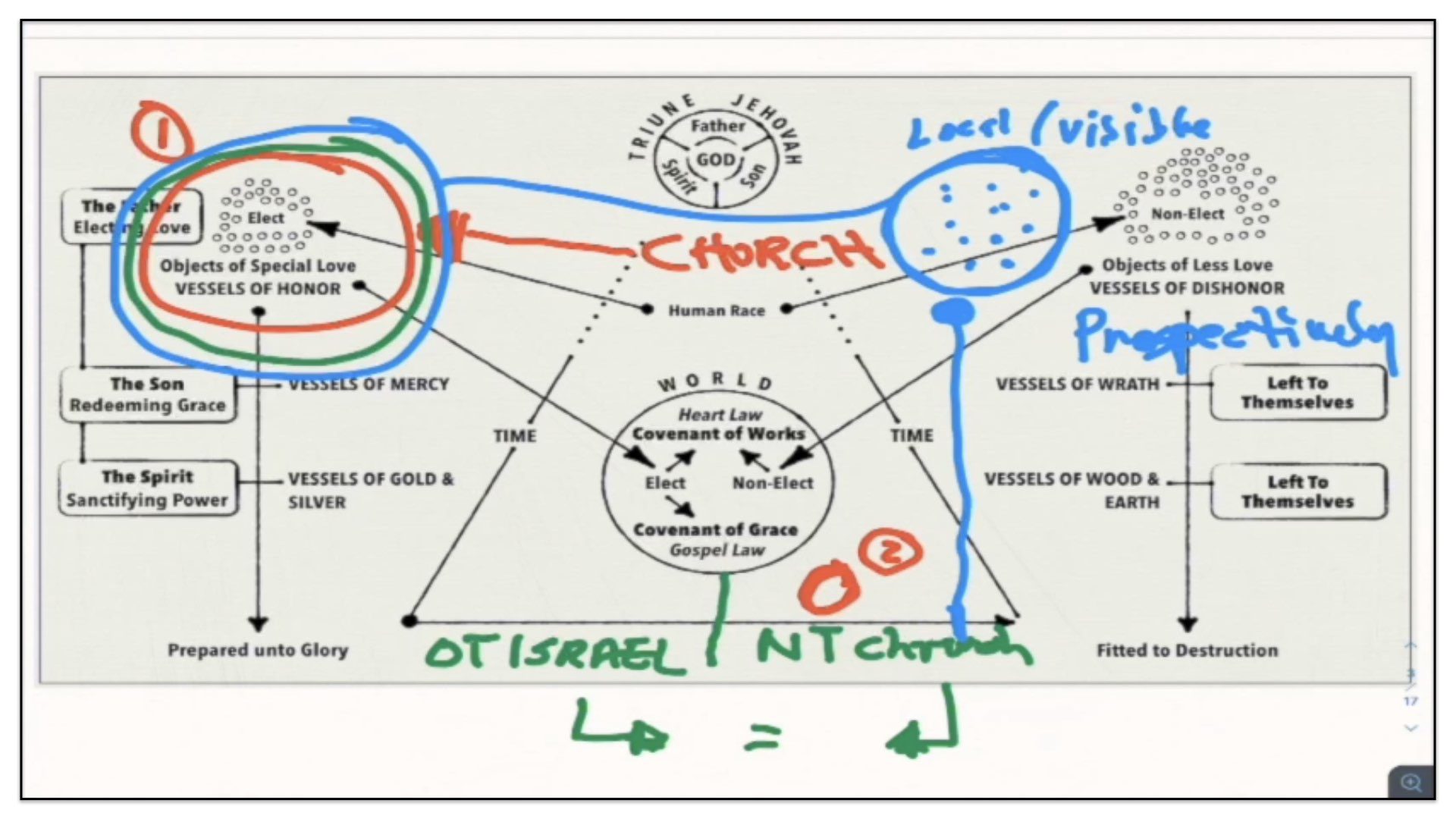
You see, the term church is used by Paul in this passage— the reference to the universal grouping of all God’s spiritually elect people—of the church prospectively in the future. A church that does not yet exist. It’s speaking of that assembly of Christ that will be gathered after He returns to the earth. And as I’ve just said, even when that takes place, that general assembly will still be local and visible. True to the same nature of the church that now is on the earth a local invisible gathering of God’s people. And while it certainly appropriate to refer to that future gathering as the general assembly, Paul does it, yet it’s not appropriate and please listen to me my dear friends, it’s not appropriate to refer to all of God’s elect people as they currently exist as a general assembly. For that they are not. Christ has not yet gathered all of His spiritually elect people together. Some have been born and died and therefore separated from their bodies and their souls ushered to heaven; others have not even yet been born. So to refer to God’s spiritually elect people as they now exist, there is no such general gathering and therefore to refer to them as the assembly of Christ is an inappropriate use of the term church. But you see, that’s how Reformed believers very often use the term church and I say it’s a very confusing way indeed of speaking of the church that now exists. When we speak of the church, when we refer to the church, it should always be a reference to a particular, physical and local congregation that exists now. I mean you could visit the location, you can enter into that house or that building, you can see the actual believers gathered together physically, worshiping God, fellowshipping together and receiving edification from one another. That’s the church of Christ.
Okay. Well, I hope it’s sufficient what I’ve shown you thus far from Hebrews chapter 12 to underscore this important interpretation of the church and why we believe why I believe it should never be viewed as a universal and invisible grouping of all God’s elect people throughout the ages.
Israel Of The Old Testament And The Church Of The New Testament DO NOT Refer To God’s Spiritually Elect People Throughout The Ages
This brings me now to say something to you about the second erroneous view that was highlighted earlier. And that is, when Reformed believers will conflate the labels Israel, church, the spiritually elect to refer to one and all the same thing. What would be my response to this?
Reformed Believers Conflate The Terms In An Attempt To Correct The False Gospel Of Dispensationalism
Well first, allow me to preface this by saying that I sympathize with Reformed believers. I understand why they’re conflating these terms. It is a reaction to Dispensationalism, for as I’ve shown you in previous studies, Dispensationalists believe that God has two different spiritually elect people with two different redemptive plans for them. Now that is heresy. We don’t believe that is the teachings of scripture at all. That’s a false gospel.
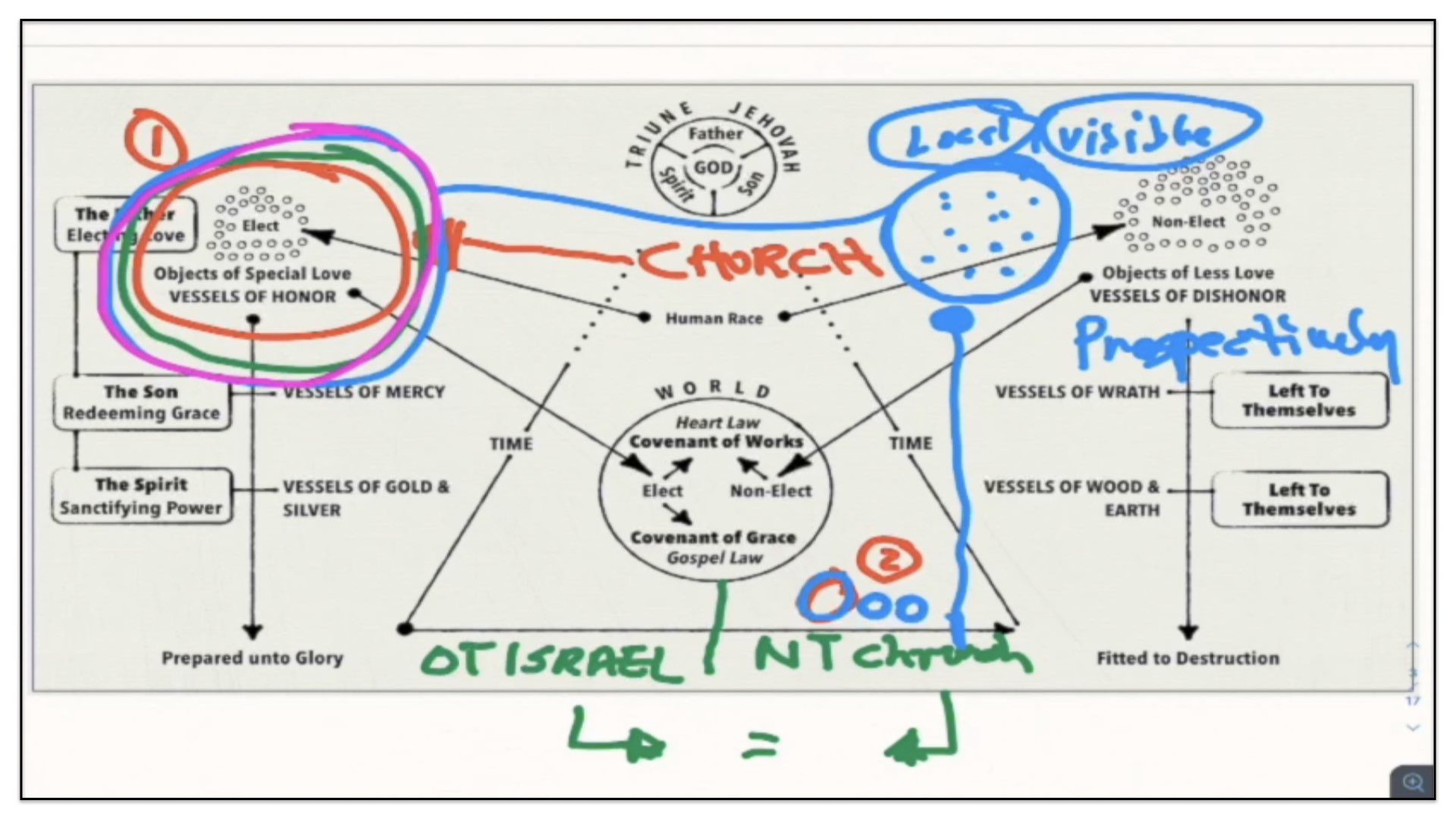
We do affirm, with the Reformed believers, that God has one spiritually elect people. We affirm that. And He has one redemptive plan for them. Correct. But now, how we go about explaining this is the key. And I feel the Reformed believers have stumbled on this point of explanation in an attempt to show the unity of scripture that God has one spiritually elect people with one redemptive plan, they loosely use biblical language and they shouldn’t do that. It only confuses the issue rather than clarifying it.
Reformed Believers Use The Terms Israel And Church Interchangeably, When They Should Use The Term Israel Only As An Analogy For All Of God’s Elect People—The Jewish People As A Nation Under The Mosaic Covenant Is An Illustration Of God’s Spiritually Elect People Under The Covenant Of Redemption (It Is Not An Illustration Of The Church Or Churches)
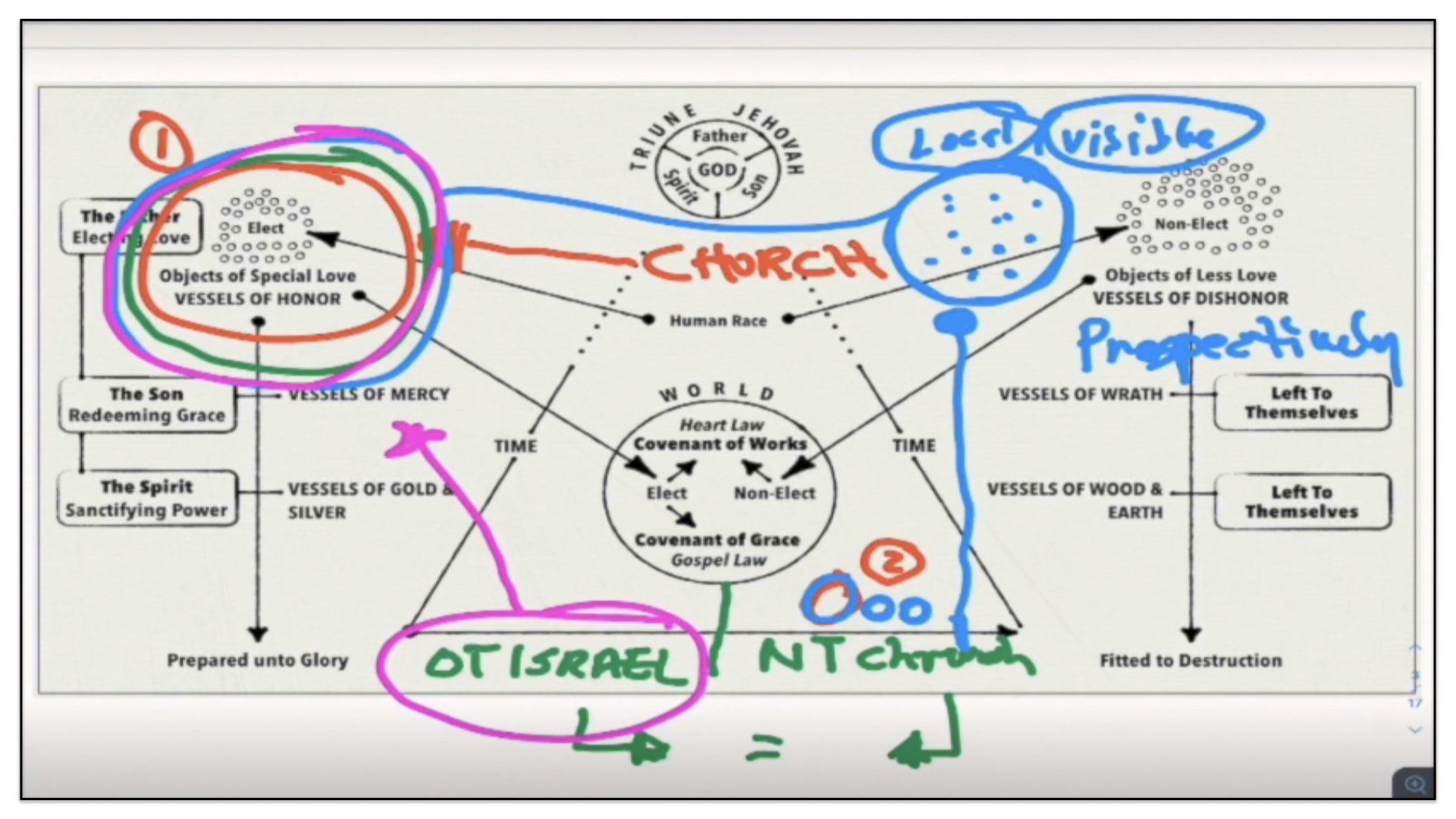
Alright, so then what is the issue at stake here? Well, the issue is this—there are some scriptures which refer to Israel as God’s spiritually elect people, so when the Reformed believers refer to Israel in this context, they say this must be a reference to God’s spiritually elect there is language in the Bible that gives support to that idea and I like to explore that language with you now.
Romans 9:6-8
Take, for instance, the words of Paul in Romans chapter 9 and I’ll read for you a statement in verse 6. Watch this—“Not as though the word of God hath taken none effect. For they are not all Israel, which are of Israel:” Now the language of this text can be a little confusing.
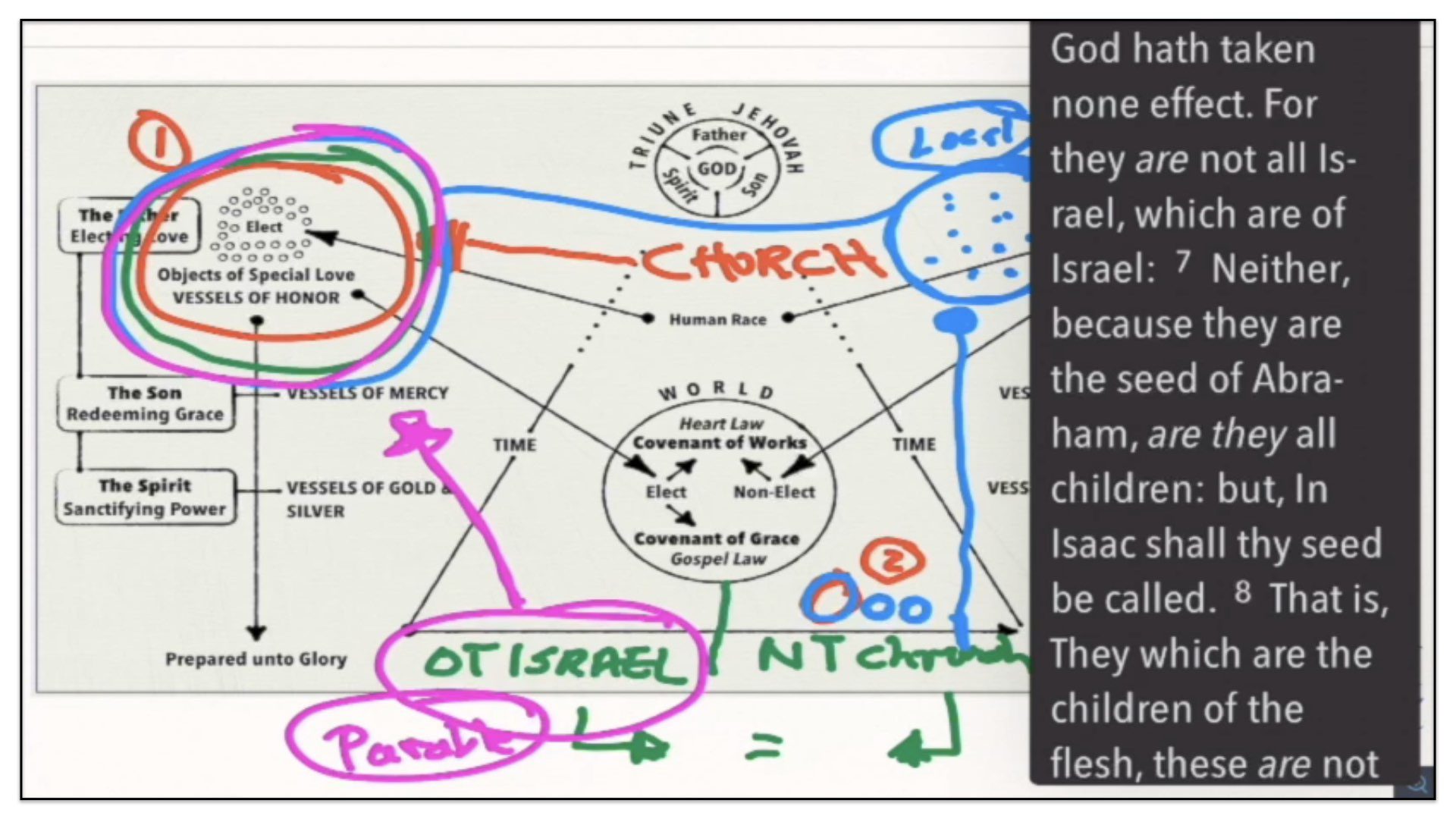
But what Paul is driving at is this, he’s using the term Israel as an analogy or a parable to illustrate the spiritually elect of God. He’s only using the real Israel as a parable or an illustration to explain to point to the the spiritually elect of God. That is, watch the text, Paul is basically saying to the church at Rome, the Jewish people as a race and nation are not all Israel; that is, they do not all belong to God’s spiritually elect people, which are of Israel, they’re not all all of Israel, true Israel, spiritual Israel. That is God’s spiritually elect. Simply meaning that just because a man or a woman is born into the Jewish race and was put under the Mosaic law, did not give to that individual a privilege of being numbered among God’s spiritually elect people. And that is what Paul is driving at in this text you see.
Romans 11:7
If I turn your attention over to Romans again chapter 11 and verse 7, listen to the language—“What then? Israel hath not obtained that which he seeketh for; but the election hath obtained it, and the rest were blinded,” Here Paul is continuing the analogy of using physical Israel as an analogy for the spiritually elect of God, and he is showing that physical Israel did not obtain eternal salvation, that which they sought for, that which they thought they belonged to, but rather the spiritually elect has obtained it, and the rest of those that are not part of God’s spiritually elect numbered among Israel are blinded.
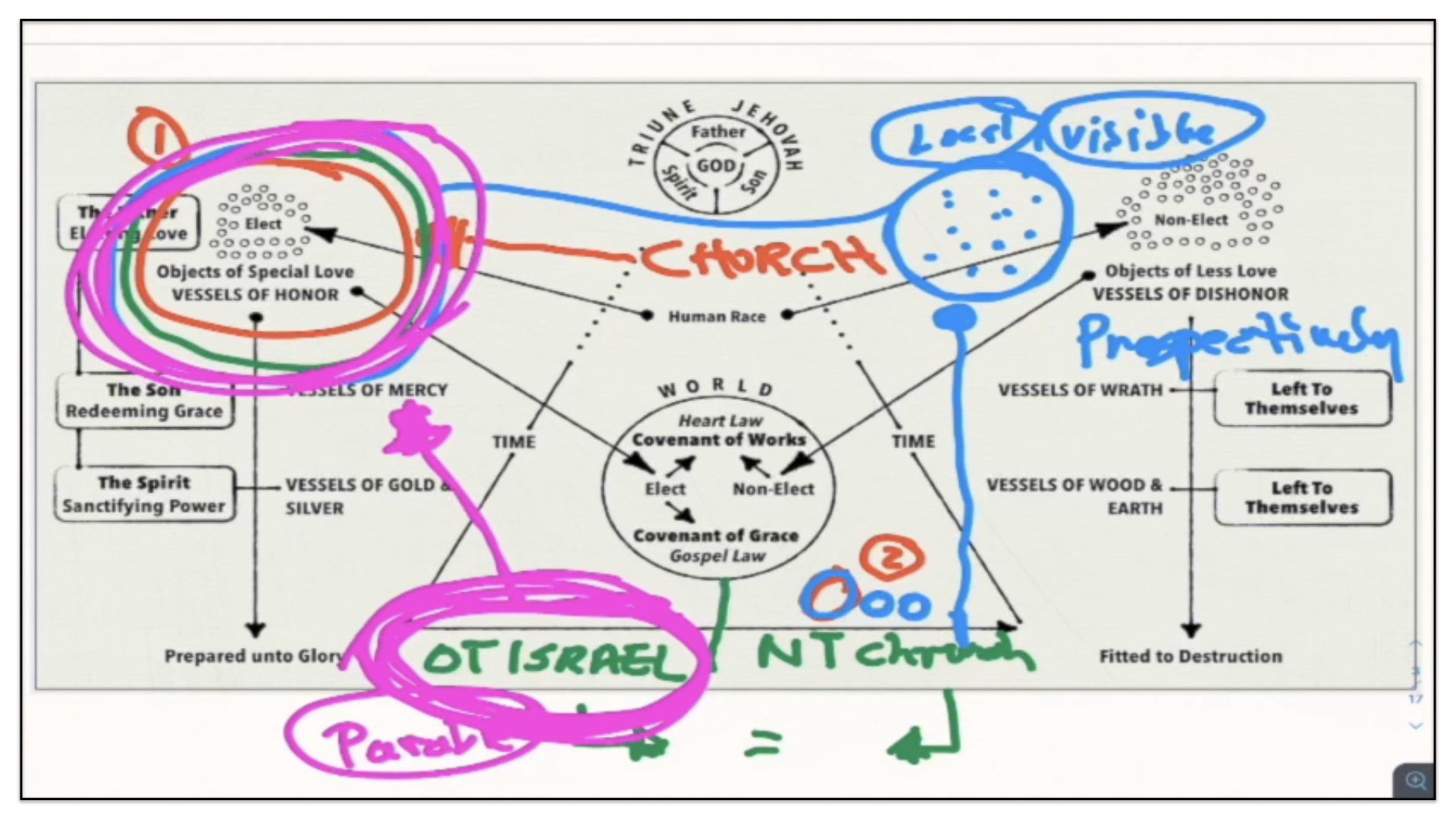
Now you see, it is possible to use the name Israel as a label or a parable for God’s spiritually elect, but it should be qualified and explained. If we go explaining, if we go teaching the scriptures and we suddenly refer to God’s spiritually elect people as Israel, will be baffled while reading through the Old and New Testament scriptures. But if we were to qualify the statement by saying, look, God had a physical people on this earth. He created a race, the Jewish race, and He set them apart with special honors and gave to them earthly material blessings and established with them covenants and made with them promises and bestowed upon them many earthly riches, all because they had a family link or lineage a biological lineage to the Messiah; if we take that as a picture of God’s spiritually elect, the Father setting apart a people unto Himself, highly favoring them, His favorites, granting unto them all spiritual blessings in heavenly places in Christ, bestowing upon them the riches of heavenly riches, then don’t you see, this is an analogy of what God did on this earth to Israel of what God does with His spiritually chosen people from eternity. And we can use the term Israel in that way, but it must be qualified.
Concluding Thoughts
How does all of this now come to a conclusion? I’d like to wrap it up and with it I wrap up this whole series of studies on the biblical covenants and I’m sure you’re happy to hear that. It’s always exciting to enter a new series, but I suspect after the third and fourth study of that series it gets a little stale and old and we’re looking for the new series to begin. Well, this has been thirteen (fifteen) studies in this series and I can only hope it’s been a blessing to you. It’s been a blessing to me as I’ve walked through these teachings of my own thoughts and heart before I’ve given them to you and I trust that if you haven’t agreed with everything I’ve put forward that at least there’s been a lot of things that have challenged the way that you think and view the scriptures and understand the teachings of Christ. Well then, how do I wrap up this particular study? Here’s a series of questions I’ll ask you and give an answer to:
Is Israel And The Church One And The Same?
Are Israel and the church. One in the same and the answer is no. Israel is the Jewish people as a nation which no longer exists. And the church is a local invisible body of baptized believers covenanted to follow the commands of Christ. Now while reading through the Old and New Testament scriptures, we must bear that distinction and those definitions in mind.
Is Israel And The Spiritually Elect One And The Same?
The second question: Are Israel and God’s spiritually elect people one and the same. And the answer is no. Israel is the Jewish people as a nation honored by God with earthly blessings by virtue of their bloodline leading to the Messiah under the authority the Mosaic Covenant. Whereas the spiritually elect are the objects of God’s special love, honored with all spiritual blessings in heavenly places by virtue of their legal and spiritual union with Christ under the authority of the gracious covenant. Again, while reading through the Old and New Testament scriptures, we must keep those distinctions in mind and remember these definitions.
Are The Spiritually Elect And The Church One And The Same?
Again, a third question: Are the spiritually elect and the church one and the same? The answer is yes and no. No, in the sense that as the church now exists it is an independent and autonomous body of baptized believers covenanted to follow the commands of Christ and each independent congregation is the church of Christ meeting in that location. But yes, the spiritually elect and the church are the same in the sense that when Christ returns He will gather together all His spiritually elect people giving to them glorified bodies, presenting them to Himself without spot or wrinkle or any such thing, at which time the spiritually elect throughout the ages will be identified as Christ’s general assembly. Now never should the term church be understood as a universal and invisible grouping of all God’s elect people. Unless of course, we’re referring to the second coming of Christ when such an assembly will be gathered. But even then, that general assembly and church of the firstborn will be local and visible.
A Final Word
Let us therefore, in conclusion, let us therefore cherish this word church. The assembly or congregation of Christ. Knowing that by this term reference is made to the actual body to which you as a baptized believer belong. Having covenanted with those brothers and sisters in Christ, the very people sitting next to you even now as you listen to this teaching, those persons that you’ve covenanted with to worship God and to serve Christ and to receive edification together as a fellowship. That’s what this term church represents. Let us therefore cherish the word, cherish the church itself. And of course every local assembly of Christ on earth today is a little picture, a little taste, a little glimpse of the glorious church which Christ will present to Himself without spot or wrinkle or blemish, that He might present that church to Himself, holy in His sight, and it’s in prospect of that great gathering I encourage you my dear friends, be patient unto the coming of the Lord. Just as the farmer exercises long patience while waiting for the harvest of precious fruit, so should we be expectantly patient while waiting for the coming of the Lord Jesus Christ. And it’s in the interval between now and Christ’s return, that you and I have the privilege to meet together with God’s people in a local place, that we might be established in our hearts and the grace of the Lord Jesus Christ building up ourselves in our most holy faith.
I pray the Lord will bless these teachings and all the teachings of this series to our hearts and give an increase to our understanding.
Jared Smith served twenty years as pastor of a Strict and Particular Baptist church in Kensington (London, England). He now serves as an Evangelist in the Philippines, preaching the gospel, organizing churches and training gospel preachers.
Jared Smith's Online Worship Services
Jared Smith's Sermons
Jared Smith on the Gospel Message
Jared Smith on the Biblical Covenants
Jared Smith on 18th Century Covenant Theology (Hyper-Calvinism)
Jared Smith on the Gospel Law
Jared Smith on Bible Doctrine
Jared Smith on Bible Reading
Jared Smith's Hymn Studies
Jared Smith on Eldership
Jared Smith's Studies In Genesis
Jared Smith's Studies in Romans
Jared Smith on Various Issues
Jared Smith, Covenant Baptist Church, Philippines
Jared Smith's Maternal Ancestry (Complete)




